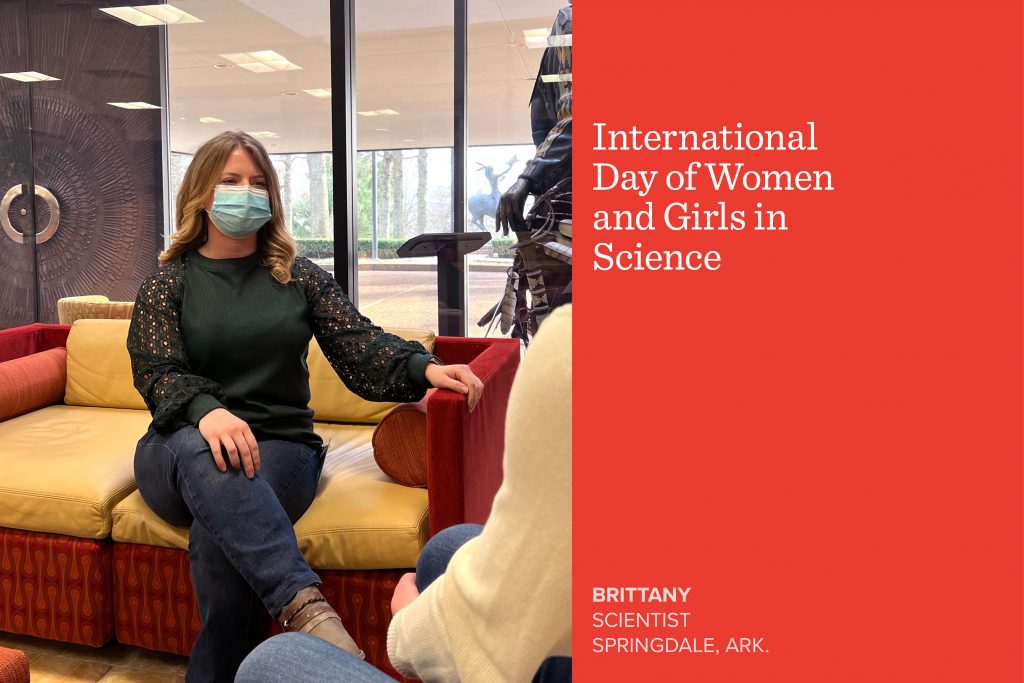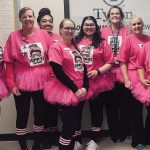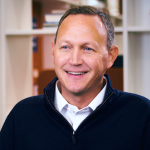Brittany has been testing the water – literally – since she was in 9th grade, after stumbling on a book on acid rain in her school’s library.
“I was mesmerized,” she says. “I took a pool pH test kit from home and started sampling rainwater.”
And so began her work to safeguard one of the world’s most precious natural resources.
Brittany studied at the University of Arkansas in Fayetteville, Dale Bumper School of Agriculture, Food and Life Sciences, earning a Bachelor of Science in environmental, soil, and water science. When it came time to choose a senior research project, she struggled to find a study that suited her passion. So, she created her own.
“Don’t accept “no” if it’s something you believe in,” she says. “I wanted to learn about water science. It’s what I wanted to specialize in.”
She had been working at Crystal Bridges Museum of American Art and saw an opportunity to study the chemistry of water in an urban pond system – something that hadn’t been done yet at that location. She drafted a hypothesis and proposed her research to Crystal Bridges and her professors. It was accepted.
“I’d go once a week and sample the pond system and learned how to process the samples in the Arkansas for Water Resources lab.”
But she also saw the need for greater water stewardship in her everyday life. Once, while hiking in Central Arkansas, she stumbled on what looked like remnants of fracking – a way of extracting oil or gas by drilling and injecting highly pressurize liquid into the ground. Acres of land, she says, were devastated and there were no animals in sight. It inspired her to action.
“Food security is a topic. Water security is a topic. And they go hand in hand – we must have both to feed the growing population. But I questioned, what can I do to be part of a greater solution?”
She started with an internship in the environmental compliance department at Tyson Foods, assisting with audits across Arkansas locations. After completing her internship, she was offered a full-time position as a sustainability associate working on natural resources stewardship. In her almost three years with Tyson, her responsibilities have grown to include global water assessments, climate-related projects, and sustainability reporting.
“My water stewardship work is about building relationships between Tyson and the community to implement action-oriented targets at high water stress locations. This includes being an environmental advocate for Tyson and the meat industry,” she says. “It really does take a village to drive change.”
It’s not enough, she says, to communicate and advocate for safer, more sustainable practices; we have to talk about why we should care about sustainable practices. And Tyson is uniquely situated to serve as an activist in the communities where we live and work and in our partnerships with independent farmers. Good, healthy food needs good, healthy water.
“We need to have fresh water sources, and we need to continue treating water back to water quality standards. We need to keep the water cycle going,” Brittany says. “There are climate risks like last year’s big ice storm in the Midwest where communities had freezing pipes and people losing access to water. We have to plan for long-term access for the communities we live in.”
Being a woman in a science field has had its challenges. Though for years we’ve heard the call, and encouragement, for more women to pursue careers in science, Brittany says it was not easy.
“Science is best supported by all forms of diversity,” she says. “I had to remind myself that I am not defined by anyone else except myself and the path and the steps it took to get here. It was my passion and my strength and everything that goes into it that helped me get to where I am today.”
And she hopes every woman and girl looking to pursue a career in science remembers the same and knows there are many people out there working for a more equitable future.
“To every woman out there, don’t be afraid to raise your voice and continue believing in yourself. We’re not giving up. We keep pressing forward.”
The United Nations declared the first International Day of Women and Girls in Science in 2015 as a way to further address the persistent gender gap in science, technology, engineering, and mathematics (STEM) fields. This year’s International Day of Women and Girls in Science Assembly focuses on “Equity, Diversity, and Inclusion: Water Unites Us,” recognizing the role of women in science as agents of change.
Advancing women – and all team members – is paramount at Tyson Foods. We celebrate the unique backgrounds, experiences, thoughts, and talents of our team members and are continuously working to ensure all team members have opportunities to grow personally and professionally. Programs like our 1+2 Maintenance Program, Upward Pathways and Upward Academy help team members develop both their careers and important life skills. Our business resource groups also champion our diversity, equity, and inclusion efforts by increasing team member networks and engagement. Learn more about how Tyson Foods supports and advances team members here.
- Cheyenne Autry Strieflerhttps://thefeed.blog/author/cheyenne-autrytyson-com/February 22, 2023
- Cheyenne Autry Strieflerhttps://thefeed.blog/author/cheyenne-autrytyson-com/November 29, 2022
- Cheyenne Autry Strieflerhttps://thefeed.blog/author/cheyenne-autrytyson-com/November 11, 2022
- Cheyenne Autry Strieflerhttps://thefeed.blog/author/cheyenne-autrytyson-com/November 7, 2022





